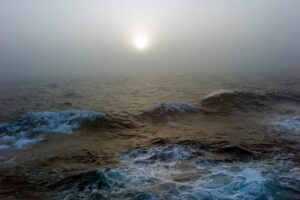In a decisive step towards marine sustainability and global environmental leadership, South Korea presented its Korea Blue Action Plan during the 10th edition of the Our Ocean Conference, a key international event on the protection of oceans, in order to showcase what a sustainable sea would look like. With an investment of 2.65 billion dollars, the Asian country outlined a roadmap aiming to make it a global reference in sustainable management of marine ecosystems.
The plan includes 76 initiatives distributed in six strategic areas: climate change, sustainable fishing, blue economy, marine pollution, protected marine areas, and maritime security. It is a comprehensive strategy that combines technological innovation, robust public policies, international cooperation, and a forward-looking vision.
For South Korea, caring for the sea is not just an environmental issue: it represents an economic, geopolitical, and cultural commitment. As a nation with an economy highly dependent on maritime trade, preserving its oceans means ensuring food security, coastal employment, innovation, and regional stability.
“The Korea Blue Action Plan is not only a commitment to the planet, but also an investment in our future,” Korean authorities stated during the conference. Ámbito attended the event by invitation from the Ministry of Culture, Tourism, and Sports of the host country.
Decarbonization and nature: the blue transition
One of the most ambitious pillars of the plan is the fight against climate change. Korea will invest over 700 million dollars in emission-free maritime corridors, clean technologies for ships, green fuel terminals, and resilient aquaculture. It will also restore underwater forests and marshes to enhance the so-called “blue carbon,” crucial for mitigating global warming.
Additionally, it will develop satellite systems for climate monitoring, predictive models, and studies on Antarctic ice melting, positioning itself as a scientific leader in oceanic research.

Responsible fishing and community revitalization
With an investment of 930 million dollars, Korea plans to strengthen its fishing system with electronic monitoring, reduce bycatch, and certify catches. Socially, it will promote private investments in coastal communities to generate employment and retain young people, and will encourage international recognition of traditional practices like the Haenyeo, the iconic female divers of Jeju.
The commitment also extends to international cooperation, with technical and technological assistance programs in countries such as Vietnam, Ghana, and Tuvalu.
Blue economy: digital, renewable, and sustainable
The economic focus of the plan translates into the development of smart ports, autonomous ships, digital maritime routes, and technological aquaculture clusters. It will also promote renewable energies such as offshore wind and wave energy, as well as a model of ecotourism that respects biodiversity.
Through tools like Marine Spatial Planning and ocean satellite accounts, Korea aims to measure and maximize the sustainable economic value of its waters.
Against pollution: from recycled nets to collecting robots
In terms of marine waste, South Korea will invest 1.77 billion dollars to become a leader in ocean waste management. It will deploy robots to collect floating garbage, implement blockage systems in rivers, and deploy ecological cleaning vessels. Additionally, it has already launched the world’s first refund system for used fishing nets, a pioneering measure aimed at global replication.
In 2025, Korea became the first country in East Asia to ratify the BBNJ treaty for the protection of biodiversity in the high seas. Internally, it committed to declare a new large-scale marine protected area each year until 2030. It also leads international efforts to protect sensitive regions such as Antarctica and the Nazca Ridge. On the security front, the country will implement artificial intelligence for vessel protection and collaborate with African nations in combating piracy.
Blue power of the 21st century
With this ambitious plan, South Korea solidifies its transformation from an international aid recipient to a donor power and a model of sustainable development. Its oceanic strategy not only seeks to preserve biodiversity, but also to promote an innovative and fair maritime economy.
In an increasingly environmentally conscious world, the Korea Blue Action Plan sets a clear course: one of economic development in harmony with the oceans, and with the planet.

South Korea has an artificial sun to generate cheap energy from nuclear fusion
The Korean Institute of Fusion Energy (KIFE) announced that KSTAR –its artificial Sun project to generate energy from nuclear fusion– was able to heat plasma to 100 million degrees Celsius for a period of 30 seconds.
Therefore, this milestone represented a new way to obtain cheap, clean, and unlimited energy on Earth through the operation of this artificial Sun.
Recently, the KIFE has created a new tungsten divertor that will allow multiplying that time by ten to raise it to 300 seconds, thus, managing the impurities generated in the reactor and allowing the release of residual gases.
Source: Ámbito.

